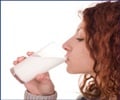- The old tale of drinking warm milk at bedtime irrevocably begets its scientific evidence
- A new study proves the benefits of bedtime milk for sound sleep
- It is found that a specific mixture of natural milk peptides called Casein Tryptic Hydrolysate (CTH) serves one to easily doze off as similar to sedative drugs, but with no side effects
Read More..
Sleep—Natural Healer
Sleep is an important part of everyday life. Good sleep secures a vital role in promoting overall physical and mental health. It is involved in the healing and repairing of various organs like the heart, brain, and blood vessels.This helps reduce the risk of chronic diseases like diabetes, high blood pressure, heart diseases, stroke, and kidney diseases.
Burden of Bad Sleep
It is noted that over one-third of U.S. adults fight to get proper sleep as per the US Centers for Disease Control and Prevention. Due to this, the sales of sedative drugs (zolpidem and benzodiazepines—commonly prescribed for insomnia) and cannabis oils (natural remedy) have escalated over the previous year.These sedative drugs impart their function by activating a specific brain protein—GABA (gamma-aminobutyric acid) receptor, that in turn suppresses brain activity and nerve signaling. This can lead to various side-effects like confusion, memory problems, muscle weakness, and high addiction (in certain cases).
Hence, to overcome the potential side effects, the study team was set on a quest to discover naturally sourced peptides in milk with a similar drowsiness effect.
Secret of Warm Milk
The CTH peptides cause a similar drowsiness effect as compared to any sedative drugs. These peptides bind with the GABA receptor to induce sleepiness without any potential side effects.Moreover, the digestive enzyme—trypsin or tryptophan in cows’ milk can highly favor the sleep-enhancing properties of these peptides by relieving the stress and provoking sleep.
Scientists, in addition, have found that this milky mixture contains a specific peptide—α-casozepine (a-CZP) that may be the reason for causing these effects. This finding may thus help formulate the peptide as a natural sleep treatment in the future.
Milk—Mixture of Sleep-Enhancing Agents
The study team also found an additional release of bioactive properties in the CTH mixture when the milk was further digested. The peptides were virtually screened during the digestion process and their ability to cross the blood-brain barrier was noted through mass spectrometry.It was found that a specific natural peptide called YPVEPF increased sleep in mice by about 25%. The peptides also improved the sleep duration > 400% when compared to the control group.
Moreover, it was found that CTH had better sleep-enhancing properties than a-CZP alone in the mouse sleep tests. This promising result stirred the curiosity to explore other properties of the CTH mixture in naturally enhancing sleep.
Importance of Diet
The study findings thus depict the significant role of nutrition and diet in generating the hormones for regulating sleeping patterns and circadian rhythms.“A large amount of the happy hormone serotonin is produced in our gut – and much of it comes from our diets. Serotonin has an active role in the production of melatonin, which regulates our sleeping patterns. It’s derived from carbohydrates and an amino acid which forms a protein called tryptophan – so certain carbohydrates and tryptophan-rich foods absolutely have a role to play in promoting better sleep,” says Rhiannon Lambert, Harley Street nutritionist.
Consequently, this may guide to a clue as to why people on a low-carb or low-energy diet struggle for sleep. The study thereby proves that it is crucial to emphasize the role of superfoods like milk and equivalents in driving proper sleep.
References:
- Identification and Screening of Potential Bioactive Peptides with Sleep-Enhancing Effects in Bovine Milk Casein Hydrolysate - (https://pubs.acs.org/doi/abs/10.1021/acs.jafc.1c03937)
- Sleep Deprivation and Deficiency - (https://www.nhlbi.nih.gov/health-topics/sleep-deprivation-and-deficiency)
Source-Medindia
















